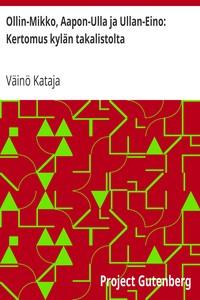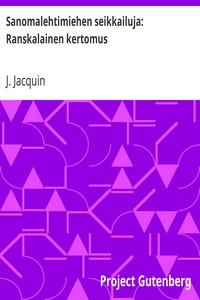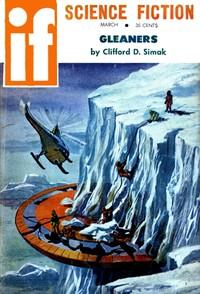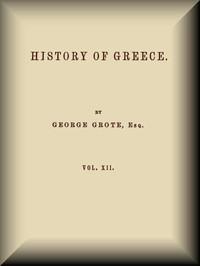Read this ebook for free! No credit card needed, absolutely nothing to pay.
Words: 291868 in 97 pages
This is an ebook sharing website. You can read the uploaded ebooks for free here. No credit cards needed, nothing to pay. If you want to own a digital copy of the ebook, or want to read offline with your favorite ebook-reader, then you can choose to buy and download the ebook.
FIRST PERIOD OF THE REIGN OF ALEXANDER THE GREAT -- SIEGE AND CAPTURE OF THEBES.
State of Greece at Alexander's accession -- dependence on the Macedonian kings. -- Unwilling subjection of the Greeks -- influence of Grecian intelligence on Macedonia. -- Basis of Alexander's character -- not Hellenic. -- Boyhood and Education of Alexander. -- He receives instruction from Aristotle. -- Early political action and maturity of Alexander -- his quarrels with his father. Family discord. -- Uncertainty of Alexander's position during the last year of Philip. -- Impression produced by the sudden death of Philip. -- Accession of Alexander -- his energy and judgment. -- Accomplices of Pausanias are slain by Alexander -- Amyntas and others are slain by him also. -- Sentiment at Athens on the death of Philip -- language of Demosthenes -- inclination to resist Macedonia, yet without overt act. -- Discontent in Greece -- but no positive movement. -- March of Alexander into Greece -- submission of Athens. -- Alexander is chosen Imperator of the Greeks in the convention at Corinth -- continued refusal of concurrence by Sparta. -- Conditions of the vote thus passed -- privileges granted to the cities. -- Authority claimed by Alexander under the convention -- degradation of the leading Grecian states. -- Encroachments and tyranny of the Macedonian officers in Greece -- complaints of the orators at Athens. -- Violations of the convention at sea by Macedonian officers. -- Language of the complaining Athenians -- they insist only on strict observance of the convention. Boldness of their language. -- Encouragements held out by Persia to the Greeks. -- Correspondence of Demosthenes with Persia -- justifiable and politic. -- March of Alexander into Thrace. He forces his way over Mount Haemus. -- His victory over the Triballi. -- He crosses the Danube, defeats the Getae, and returns back. -- Embassy of Gauls to Alexander. His self-conceit. -- Victories of Alexander over Kleitus and the Illyrians. -- The Thebans declare their independence against Macedonia. -- They are encouraged by Alexander's long absence in Thrace, and by reports of his death. -- The Theban exiles from Athens get possession of Thebes. -- They besiege the Macedonians in the Kadmeia, and entreat aid from other Greeks. Favorable sympathies shown towards them, but no positive aid. -- Chances of Thebes and liberation, not unfavorable. -- Rapid march and unexpected arrival of Alexander with his army before Thebes. His good fortune as to the time of hearing the news. -- Siege of Thebes. Proclamation of Alexander. Determination of the Thebans to resist. -- Capture of Thebes by assault. Massacre of the population. -- Thebes is razed; the Theban captives sold as slaves; the territory distributed among the neighboring cities. -- The Kadmeia is occupied as a Macedonian Military post. Retribution upon the Thebans from Orchomenus and Plataea. -- Sentiments of Alexander, at the time and afterwards, respecting the destruction of Thebes. -- Extreme terror spread throughout Greece. Sympathy of the Athenians towards the Theban exiles. -- Alexander demands the surrender of the chief anti-Macedonian leaders at Athens. Memorable debate at Athens. The demand refused. -- Embassy of the Athenians to Alexander. He is persuaded to acquiesce in the refusal, and to be satisfied with the banishment of Charidemus and Ephialtes. -- Influence of Phokion in obtaining these milder terms -- his increased ascendency at Athens. -- Alexander at Corinth -- obedience of the Grecian synod -- interview with the philosopher Diogenes. -- Reconstitution of Orchomenus and Plataea. Return of Alexander to Pella. -- Military operations of Parmenio in Asia Minor against Memnon. 1-49
ASIATIC CAMPAIGNS OF ALEXANDER.
During Alexander's reign, the history of Greece is nearly a blank. To what extent the Asiatic projects of Alexander belonged to Grecian history. -- Pan-hellenic pretences set up by Alexander. The real feeling of the Greeks was adverse to his success. -- Analogy of Alexander's relation to the Greeks -- with those of the Emperor Napoleon to the Confederation of the Rhine. -- Greece an appendage, but a valuable appendage, to Macedonia. -- Extraordinary military endowments and capacity of Alexander. -- Changes in Grecian warfare, antecedent and contributory to the military organization of Macedonia. -- Macedonian military condition before Philip. Good and firm cavalry: poor infantry. -- Philip re-arms and reorganizes the infantry. Long Macedonian pike or sarissa. -- Macedonian phalanx -- how armed and arrayed. -- It was originally destined to contend against the Grecian hoplites as organized by Epaminondas. -- Regiments and divisions of the phalanx -- heavy-armed infantry. -- Light infantry of the line -- Hypaspistae, or Guards. -- Light troops generally -- mostly foreigners. -- Macedonian cavalry -- its excellence -- how regimented. -- The select Macedonian Body-guards. The Royal Pages. -- Foreign auxiliaries -- Grecian hoplites -- Thessalian cavalry -- Paeonians -- Illyrians -- Thracians, etc. -- Magazines, war-office, and dep?t, at Pella. -- Macedonian aptitudes -- purely military -- military pride stood to them in lieu of national sentiment. -- Measures of Alexander previous to his departure for Asia. Antipater left as viceroy at Pella. -- March of Alexander to the Hellespont. Passage across to Asia. -- Visit of Alexander to Ilium. -- Analogy of Alexander to the Greek heroes. -- Review and total of the Macedonian army in Asia. -- Chief Macedonian officers. -- Greeks in Alexander's service -- Eumenes of Kardia. -- Persian forces -- Mentor and Memnon the Rhodians. -- Succession of the Persian crown -- Ochus -- Darius Codomannus. -- Preparations of Darius for defence. -- Operations of Memnon before Alexander's arrival. -- Superiority of the Persians at sea: their imprudence in letting Alexander cross the Hellespont unopposed. -- Persian force assembled in Phrygia, under Arsites and others. -- Advice of Memnon, to avoid fighting on land, and to employ the fleet for aggressive warfare in Macedonia and Greece. -- Arsites rejects Memnon's advice, and determines to fight. -- The Persians take post on the river Granikus. -- Alexander reaches the Granikus, and resolves to force the passage at once, in spite of the dissuasion of Permenio. -- Disposition of the two armies. -- Battle of the Granikus. -- Cavalry battle. -- Personal danger of Alexander. His life saved by Kleitus. Complete victory of Alexander. Destruction of the Grecian infantry on the side of the Persians. -- Loss of the Persians -- numbers of their leading men slain. -- Small loss of the Macedonians. -- Alexander's kindness to his wounded soldiers, and severe treatment of the Grecian prisoners. -- Unskilfulness of the Persian leaders. Immense impression produced by Alexander's victory. -- Terror and submission of the Asiatics to Alexander. Surrender of the strong fortress of Sardis. -- He marches from Sardis to the coast. Capture of Ephesus. -- He finds the first resistance at Miletus. -- Near approach of the Persian fleet. Memnon is made commander-in-chief of the Persians. -- The Macedonian fleet occupies the harbor of Miletus, and keeps out the Persians. Alexander declines naval combat. His debate with Parmenio. -- Alexander besieges Miletus. Capture of the city. -- The Persian fleet retires to Halikarnassus. Alexander disbands his own fleet. -- March of Alexander to Halikarnassus. Ada queen of Karia joins him. Strong garrison, and good defensive preparation, at Halikarnassus. -- Siege of Halikarnassus. Bravery of the garrison, under Ephialtes the Athenian. -- Desperate sally of Ephialtes -- at first successful, but repulsed -- he himself is slain. -- Memnon is forced to abandon Halikarnassus, and withdraw the garrison by sea, retaining only the citadel. Alexander enters Halikarnassus. -- Winter campaign of Alexander along the southern coast of Asia Minor. -- Alexander concludes his winter campaign at Gordium. Capture of Kelaenae. -- Appendix on the Macedonian Sarissa. 49-104
SECOND AND THIRD ASIATIC CAMPAIGNS OF ALEXANDER -- BATTLE OF ISSUS -- SIEGE OF TYRE.
Alexander cuts the Gordian knot. -- He refuses the liberation of the Athenian prisoners. -- Progress of Memnon and the Persian fleet -- they acquire Chios and a large part of Lesbos -- they besiege Mitylene. Death of Memnon. Capture of Mitylene. -- Hopes excited in Greece by the Persian fleet, but ruined by the death of Memnon. -- Memnon's death an irreparable mischief to Darius. -- Change in Darius's plan caused by this event. He resolves to take the offensive on land. His immense land-force. -- Free speech and sound judgment of Charidemus. He is put to death by Darius. -- Darius abandoned Memnon's plans, just at the time when he had the best defensive position for executing them with effect. -- Darius recalls the Grecian mercenaries from the fleet. -- Criticism of Arrian on Darius's plan. -- March of Alexander from Gordium through Paphlagonia and Kappadokia. -- He arrives at the line of Mount Taurus -- difficulties of the pass. -- Conduct of Arsames, the Persian satrap. Alexander passes Mount Taurus without the least resistance. He enters Tarsus. -- Dangerous illness of Alexander. His confidence in the physician Philippus, who cures him. -- Operations of Alexander in Kilikia. -- March of Alexander out of Kilikia, through Issus, to Myriandrus. -- March of Darius from the interior to the eastern side of Mount Amanus. Immense numbers of his army: great wealth and ostentation in it: the treasure and baggage sent to Damascus. -- Position of Darius on the plain eastward of Mount Amanus. He throws open the mountain passes, to let Alexander come through and fight a pitched battle. -- Impatience of Darius at the delay of Alexander in Kilikia. He crosses Mount Amanus to attack Alexander in the defiles of Kilikia. -- He arrives in Alexander's rear, and captures Issus. -- Return of Alexander from Myriandrus: his address to his army. -- Position of the Macedonian army south of the river Pinarus. -- Position of the Persian army north of the Pinarus. -- Battle of Issus. -- Alarm and immediate flight of Darius -- defeat of the Persians. -- Vigorous and destructive pursuit by Alexander -- capture of the mother and wife of Darius. -- Courteous treatment of the regal female prisoners by Alexander. -- Complete dispersion of the Persian army -- Darius recrosses the Euphrates -- escape of some Perso-Grecian mercenaries. -- Prodigious effect produced by the victory of Issus. -- Effects produced in Greece by the battle of Issus. Anti-Macedonian projects crushed. -- Capture of Damascus by the Macedonians, with the Persian treasure and prisoners. Capture and treatment of the Athenian Iphikrates. Altered relative position of Greeks and Macedonians. -- Alexander in Phenicia. Aradus, Byblus, and Sidon open their gates to him. -- Letter of Darius soliciting peace and the restitution of the regal captives. Haughty reply of Alexander. -- Importance of the voluntary surrender of the Phenician towns to Alexander. -- Alexander appears before Tyre -- readiness of the Tyrians to surrender, yet not without a point reserved -- he determines to besiege the city. -- Exorbitant dispositions and conduct of Alexander. -- He prepares to besiege Tyre -- situation of the place. -- Chances of the Tyrians -- their resolution not unreasonable. -- Alexander constructs a mole across the strait between Tyre and the mainland. The project is defeated. -- Surrender of the princes of Cyprus to Alexander -- He gets hold of the main Phenician and Cyprian fleet. -- He appears before Tyre with a numerous fleet, and blocks up the place by sea. -- Capture of Tyre by storm -- desperate resistance by the citizens. -- Surviving males, 2000 in number, hanged by order of Alexander -- The remaining captives sold. -- Duration of the siege for seven months. Sacrifice of Alexander to Herakles. -- Second letter from Darius to Alexander, who requires unconditional submission. -- The Macedonian fleet overpowers the Persian and becomes master of the AEgean with the islands. -- March of Alexander towards Egypt -- siege of Gaza. -- His first assaults fail -- he is wounded -- he erects an immense mound round the town. -- Gaza is taken by storm, after a siege of two months. -- The garrison are all slain, except the governor Batis, who becomes prisoner, severely wounded. -- Wrath of Alexander against Batis, whom he causes to be tied to a chariot, and dragged round the town. -- Alexander enters Egypt, and occupies it without resistance -- He determines on founding Alexandria. -- His visit to the temple and oracle of Ammon. The oracle proclaims him to be the son of Zeus. -- Arrangements made by Alexander at Memphis. -- Grecian prisoners brought from the AEgean. -- He proceeds to Phenicia -- message from Athens. Splendid festivals. Reinforcements sent to Antipater. -- He marches to the Euphrates -- crosses it without opposition at Thapsakus. -- March across from the Euphrates to the Tigris. Alexander fords the Tigris above Nineveh, without resistance. -- Eclipse of the moon. Alexander approaches near the army of Darius in position. -- Inaction of Darius since the defeat at Issus. -- Paralyzing effect upon him produced by the captivity of his mother and wife. -- Good treatment of the captive females by Alexander -- necessary to keep up their value as hostages. -- Immense army collected by Darius, in the plains eastward of the Tigris -- near Arbela. -- He fixes the spot for encamping and awaiting the attack of Alexander -- in a level plain near Gaugamela. -- His equipment and preparation -- better arms -- numerous scythed chariots -- elephants. -- Position and battle array of Darius. -- Preliminary movements of Alexander -- discussions with Parmenio and other officers. His careful reconnoitring in person. -- Dispositions of Alexander for the attack -- array of the troops. -- Battle of Arbela. -- Cowardice of Darius -- he sets the example of flight -- defeat of the Persians. -- Combat on the Persian right between Mazaeus and Parmenio. Flight of the Persian host -- energetic pursuit by Alexander. -- Escape of Darius. Capture of the Persian camp, and of Arbela. -- Loss in the battle. Completeness of the victory. Entire and irreparable dispersion of the Persian army. -- Causes of the defeat -- cowardice of Darius. Uselessness of his immense numbers. -- Generalship of Alexander. -- Surrender of Babylon and Susa, the two great capitals of Persia. Alexander enters Babylon. Immense treasures acquired in both places. -- Alexander acts as king of Persia, and nominates satraps. He marches to Susa. He remodels the divisions of his army. -- Alexander marches into Persis proper -- he conquers the refractory Uxii, in the intermediate mountains. -- Difficult pass called the Susian Gates, on the way to Persepolis. Ariobarzanes the satrap repulses Alexander, who finds means to turn the pass, and conquer it. -- Alexander enters Persepolis. Mutilated Grecian captives. -- Immense wealth, and national monuments of every sort, accumulated in Persepolis. -- Alexander appropriates and carries away the regal treasures, and then gives up Persepolis to be plundered and burnt by the soldiers. -- Alexander rests his troops, and employs himself in conquering the rest of Persis. -- Darius a fugitive in Media. 104-178
MILITARY OPERATIONS AND CONQUESTS OF ALEXANDER, AFTER HIS WINTER QUARTERS IN PERSIS, DOWN TO HIS DEATH AT BABYLON.
GRECIAN AFFAIRS FROM THE LANDING OF ALEXANDER IN ASIA TO THE CLOSE OF THE LAMIAN WAR.
State of the Grecian world when Alexander crossed the Hellespont. -- Grecian spirit might have been called into action if the Persians had played their game well. -- Hopes raised in Greece, first by the Persian fleet in the AEgean, next by the two great Persian armies on land. -- Public acts and policy at Athens -- decidedly pacific. -- Phokion and Demades were leading ministers at Athens -- they were of macedonizing politics. -- Demosthenes and Lykurgus, though not in the ascendent politically, are nevertheless still public men of importance. Financial activity of Lykurgus. -- Position of Demosthenes -- his prudent conduct -- Anti-Macedonian movement from Sparta -- King Agis visits the Persian admirals in the AEgean. His attempts both in Krete and in the Peloponnesus. -- Agis levies an army in Peloponnesus, and makes open declaration against Antipater. -- Agis, at first partially successful, is completely defeated by Antipater, and slain. -- Complete submission of all Greece to Antipater -- Spartan envoys sent up to Alexander in Asia. -- Untoward result of the defensive efforts of Greece -- want of combination. -- Position of parties at Athens during the struggle of Agis -- reaction of the macedonizing party after his defeat. -- Judicial contest between AEschines and Demosthenes. Preliminary circumstances as to the proposition of Ktesiphon, and the indictment by AEschines. -- Accusatory harangue of AEschines, nominally against the proposition of Ktesiphon, really against the political life of Demosthenes. -- Appreciation of AEschines, on independent evidence, as an accuser of Demosthenes. -- Reply of Demosthenes -- oration De Coron?. -- Funeral oration of extinct Grecian freedom. -- Verdict of the Dikasts -- triumph of Demosthenes -- exile of AEschines. -- Causes of the exile of AEschines -- he was the means of procuring coronation for Demosthenes. -- Subsequent accusation against Demosthenes, in the affair of Harpalus. -- Flight of Harpalus to Athens -- his previous conduct and relations with Athens. -- False reports conveyed to Alexander, that the Athenians had identified themselves with Harpalus. -- Circumstances attending the arrival of Harpalus at Sunium -- debate in the Athenian assembly -- promises held out by Harpalus -- the Athenians seem at first favorably disposed towards him. -- Phokion and Demosthenes both agree in dissuading the Athenians from taking up Harpalus. -- Demand by Antipater for the surrender of Harpalus -- the Athenians refuse to comply, but they arrest Harpalus and sequestrate his treasure for Alexander. -- Demosthenes moves the decree for arrest of Harpalus, who is arrested, but escapes. -- Conduct of Demosthenes in regard to the treasure of Harpalus -- deficiency of the sum counted and realized, as compared with the sum announced by Harpalus. -- Suspicions about this money -- Demosthenes moves that the Areopagus shall investigate the matter -- the Areopagites bring in a report against Demosthenes himself, with Demades and others, as guilty of corrupt appropriation. Demosthenes is tried on this charge, condemned, and goes into exile. -- Was Demosthenes guilty of such corrupt appropriation? Circumstances as known in the case. -- Demosthenes could not have received the money from Harpalus, since he opposed him from first to last. -- Had Demosthenes the means of embezzling, after the money had passed out of the control of Harpalus? Answer in the negative. Accusatory speech of Deinarchus -- virulent invective destitute of facts. -- Change of mind respecting Demosthenes, in the Athenean public, in a few months. -- Probable reality of the case, respecting the money of Harpalus, and the sentence of the Areopagus. -- Rescript of Alexander to the Grecian cities, directing that the exiles should be recalled in each. -- Purpose of the rescript -- to provide partisans for Alexander in each of the cities. Discontents in Greece. -- Effect produced in Greece, by the death of Alexander. The Athenians declare themselves champions of the liberation of Greece, in spite of Phokion's opposition. -- The AEtolians and many other Greeks join the confederacy for liberation -- activity of the Athenian Leosthenes as General. -- Athenian envoys sent round to invite co-operation from the various Greeks. -- Assistance lent to the Athenian envoys by Demosthenes, though in exile. -- He is recalled to Athens, and receives an enthusiastic welcome. -- Large Grecian confederacy against Antipater -- nevertheless without Sparta. Boeotia strongly in the Macedonian interest. Leosthenes with the confederate army marches into Thessaly. -- Battle in Thessaly -- victory of Leosthenes over Antipater, who is compelled to throw himself into Lamia, and await succors from Asia -- Leosthenes forms the blockade of Lamia: he is slain. -- Misfortune of the death of Leosthenes. Antiphilus is named in his place. Relaxed efforts of the Grecian army. -- Leonnatus, with a Macedonian army from Asia, arrives in Thessaly. His defeat and death. -- Antipater escapes from Lamia, and takes the command. -- War carried on by sea between the Macedonian and Athenian fleets. -- Reluctance of the Greek contingents to remain on long-continued service. The army in Thessaly is thinned by many returning home. -- Expected arrival of Kraterus to reinforce Antipater. Relations between the Macedonian officers. -- State of the regal family, and of the Macedonian generals and soldiery, after the death of Alexander. -- Philip Aridaeus is proclaimed king: the satrapies are distributed among the principal officers. -- Perdikkas the chief representative of central authority, assisted by Eumenes of Kardia. -- List of projects entertained by Alexander at the time of his death. The generals dismiss them as too vast. -- Plans of Leonnatus and Kleopatra. -- Kraterus joins Antipater in Macedonia with a powerful army. Battle of Krannon in Thessaly. Antipater gains a victory over the Greeks though not a complete one. -- Antiphilus tries to open negotiations with Antipater, who refuses to treat except with each city singly. Discouragement among the Greeks. Each city treats separately. Antipater grants favorable terms to all, except Athenians and AEtolians. Antipater and his army in Boeotia -- Athens left alone and unable to resist. Demosthenes and the other anti-Macedonian orators take flight. Embassy of Phokion, Xenokrates, and others to Antipater. -- Severe terms imposed upon Athens by Antipater. -- Disfranchisement and deportation of the 12,000 poorest Athenian citizens. -- Hardship suffered by the deported poor of Athens -- Macedonian garrison placed in Munychia. -- Demosthenes, Hyperides, and others, are condemned to death in their absence. Antipater sends officers to track and seize the Grecian exiles. He puts Hyperides to death. -- Demosthenes in sanctuary at Kalauria -- Archias with Thracian soldiers comes to seize him -- he takes poison, and dies. -- Miserable condition of Greece -- life and character of Demosthenes. -- Dishonorable position of Phokion at Athens under the Macedonian occupation. 275-331
FROM THE LAMIAN WAR TO THE CLOSE OF THE HISTORY OF FREE HELLAS AND HELLENISM.
Antipater purges and remodels the Peloponnesian cities. He attacks the AEtolians, with a view of departing them across to Asia. His presence becomes necessary in Asia: he concludes a pacification with the AEtolians. -- Plans of Perdikkas -- intrigues with the princesses at Pella. -- Antigonus detects the intrigues, and reveals them to Antipater and Kraterus. -- Unpropitious turn of fortune for the Greeks, in reference to the Lamian war. -- Antipater and Kraterus in Asia -- Perdikkas marches to attack Ptolemy in Egypt, but is killed by a mutiny of his own troops. Union of Antipater, Ptolemy, Antigonus, etc. New distribution of the satrapies, made at Triparadeisus. -- War between Antigonus and Eumenes in Asia. Energy and ability of Eumenes. He is worsted and blocked up in Nora. -- Sickness and death of Antipater. The Athenian orator Demades is put to death in Macedonia -- Antipater sets aside his son Kassander, and names Polysperchon viceroy. Discontent and opposition of Kassander. -- Kassander sets up for himself, gets possession of Munychia, and forms alliance with Ptolemy and Antigonus against Polysperchon. Plans of Polysperchon -- alliance with Olympias in Europe, and with Eumenes in Asia -- enfranchisement of the Grecian cities. -- Ineffectual attempts of Eumenes to uphold the imperial dynasty in Asia: his gallantry and ability: he is betrayed by his own soldiers, and slain by Antigonus. -- Edict issued by Polysperchon at Pella, in the name of the imperial dynasty -- subverting the Antipatrian oligarchies in the Grecian cities, restoring political exiles, and granting free constitutions to each. -- Letters and measures of Polysperchon to enforce the edict. State of Athens: exiles returning: complicated political parties: danger of Phokion. -- Negotiations of the Athenians with Nikanor, governor of Munychia for Kassander. -- Nikanor seizes Peiraeus by surprise. Phokion, though forewarned, takes no precautions against it. -- Mischief to the Athenians, as well as to Polysperchon, from Nikanor's occupation of Peiraeus; culpable negligence, and probable collusion, of Phokion. -- Arrival of Alexander : his treacherous policy to the Athenians; Kassander reaches Peiraeus. -- Intrigues of Phokion with Alexander -- he tries to secure for himself the protection of Alexander against the Athenians. -- Return of the deported exiles to Athens -- public vote passed in the Athenian assembly against Phokion and his colleagues. Phokion leaves the city, is protected by Alexander, and goes to meet Polysperchon, in Phokis. -- Agnonides and others are sent as deputies to Polysperchon, to accuse Phokion and to claim the benefit of the regal edict. -- Agnonides and Phokion are heard before Polysperchon -- Phokion and his colleagues are delivered up as prisoners to the Athenians. Phokion is conveyed as prisoner to Athens, and brought for trial before the assembly. Motion of his friends for exclusion of non-qualified persons. -- Intense exasperation of the returned exiles against Phokion -- grounds for that feeling. -- Phokion is condemned to death -- vindictive manifestation against him in the assembly, furious and unanimous. -- Death of Phokion and his four colleagues. -- Alteration of the sentiment of the Athenians towards Phokion, not long afterwards. Honors shown to his memory. -- Explanation of this alteration. Kassander gets possession of Athens and restores the oligarchical or Phokionic party. -- Life and character of Phokion. -- War between Polysperchon and Kassander, in Attica and Peloponnesus. Polysperchon is repulsed in the siege of Megalopolis, and also defeated at sea. -- Increased strength of Kassander in Greece -- he gets possession of Athens. -- Restoration of the oligarchical government at Athens, though in a mitigated form, under the Phalerean Demetrius. -- Administration of the Phalerean Demetrius at Athens, in a moderate spirit. Census taken of the Athenian population -- Kassander in Peloponnesus -- many cities join him -- the Spartans surround their city with walls. -- Feud in the Macedonian imperial family -- Olympias puts to death Philip Aridaeus and Eurydik? -- she reigns in Macedonia: her bloody revenge against the partisans of Antipater. -- Kassander passes into Macedonia -- defeats Olympias, and becomes master of the country -- Olympias is besieged in Pydna, captured, and put to death. -- Great power of Antigonus in Asia. Confederacy of Kassander, Lysimachus, Ptolemy, and Seleukus against him. -- Kassander founds Kassandreia, and restores Thebes. -- Measures of Antigonus against Kassander -- he promises freedom to the Grecian cities -- Ptolemy promises the like. Great power of Kassander in Greece. -- Forces of Antigonus in Greece. Considerable success against Kassander. -- Pacification between the belligerents. Grecian autonomy guaranteed in name by all. Kassander puts to death Roxana and her child. -- Polysperchon espouses the pretensions of Herakles, son of Alexander, against Kassander. He enters into compact with Kassander, assassinates the young prince, and is recognized as ruler of Southern Greece. -- Assassination of Kleopatra, last surviving relative of Alexander the Great, by Antigonus. -- Ptolemy of Egypt in Greece -- after some successes, he concludes a truce with Kassander. Passiveness of the Grecian cities. -- Sudden arrival of Demetrius Poliorketes in Peiraeus. The Athenians declare in his favor. Demetrius Phalereus retires to Egypt. Capture of Munychia and Megara. -- Demetrius Poliorketes enters Athens in triumph. He promises restoration of the democracy. Extravagant votes of flattery passed by the Athenians towards him. Two new Athenian tribes created. -- Alteration of tone and sentiment in Athens, during the last thirty years. -- Contrast of Athens as proclaimed free by Demetrius Poliorketes, with Athens after the expulsion of Hippias. -- Opposition made by Demochares, nephew of Demosthenes, to these obsequious public flatteries. -- Demetrius Phalereus condemned in his absence. Honorable commemoration of the deceased orator Lykurgus. Restrictive law passed against the philosophers -- they all leave Athens. The law is repealed next year, and the philosophers return to Athens. -- Exploits of Demetrius Poliorketes. His long siege of Rhodes. Gallant and successful resistance of the citizens. -- His prolonged war, and ultimate success in Greece, against Kassander. -- Return of Demetrius Poliorketes to Athens -- his triumphant reception -- memorable Ithyphallic hymn addressed to him. -- Helpless condition of the Athenians -- proclaimed by themselves. -- Idolatry shown to Demetrius at Athens. He is initiate in the Eleusinian mysteries, out of the regular season. -- March of Demetrius into Thessaly -- he passes into Asia and joins Antigonus -- great battle of Ipsus, in which the four confederates completely defeat Antigonus, who is slain and his Asiatic power broken up and partitioned. -- Restoration of the Kassandrian dominion in Greece. Lachares makes himself despot at Athens, under Kassander. Demetrius Poliorketes returns, and expels Lachares. He garrisons Peiraeus and Munychia. -- Death of Kassander. Bloody feuds among his family. -- Demetrius acquires the crown of Macedonia. -- Antigonus Gonatas master of Macedonia and Greece. Permanent rule of the Antigonid dynasty in Macedonia, until the conquest of that country by the Romans. -- Spirit of the Greeks broken -- isolation of the cities from each other by Antigonus. -- The Greece of Polybius cannot form a subject of history by itself, but only as an appendage to foreign neighbors. -- Evidence of the political nullity of Athens -- public decree in honor of Demochares -- what acts are recorded as his titles to public gratitude. 331-393
SICILIAN AND ITALIAN GREEKS -- AGATHOKLES.
Free books android app tbrJar TBR JAR Read Free books online gutenberg
More posts by @FreeBooks

: Ollin-Mikko Aapon-Ulla ja Ullan-Eino: Kertomus kylän takalistolta by Kataja V In - Finnish fiction 20th century










